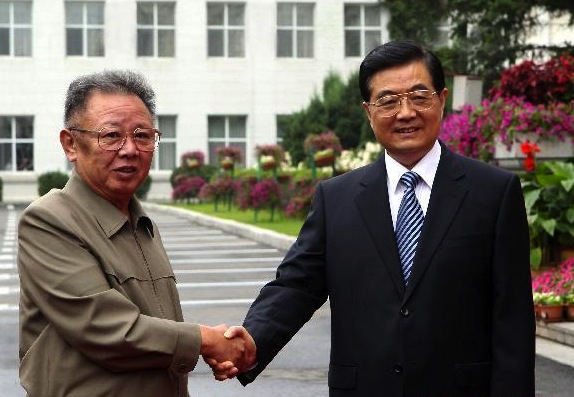
SEOUL—North Korean dictator Kim Jong II met Chinese President Hu Jintao during his five-day visit to northeast China, the Chinese government confirmed Monday night as Mr. Kim left the country, in a surprise get-together that underscored their solidarity as they cope with pressure from the U.S. and other countries to act more responsibly.
The announcement was the climax of what appeared to be a coordinated public-relations push by China on Monday, beginning with stories in several media outlets praising the China-North Korea relationship while also saying Beijing shouldn’t be held responsible for Pyongyang’s provocative actions.
The meeting happened Friday, though China, as it has done with Mr. Kim’s previous visits, waited until he left the country to say he had been there.
In the initial reports confirming the meeting between Messrs. Kim and Hu, China’s state media said that Mr. Kim wanted a resumption of the six-nation talks aimed at striking a bargain for denuclearizing North Korea. They also hinted that Mr. Kim was interested in the economic overhauls that opened China to the world, though they didn’t say he endorsed or would follow them.
Mr. Kim for years has resisted requests of Chinese leaders to open up North Korea’s economy. Late last year, his regime tried to clamp down on market activities but halted the effort when the government couldn’t feed people.
Mr. Hu said on state TV that China should expand its economic cooperation with North Korea. Since Mr. Kim’s entourage was spotted in China on Thursday, analysts have speculated that one reason he made the trip was to seek more money and assistance for the impoverished North.
Analysts also speculated that Mr. Kim brought his expected heir-apparent, son Kim Jong Eun, to meet Chinese officials ahead of a political meeting in Pyongyang next week that may be the son’s public debut in North Korea. The Chinese news reports about the visit did not mention the son, however.
“I think there are other two issues Kim wants to talk about with China,” said Jin Hanyi, head of Northeastern Asian Research Institute at Yanbian University in Jilin. “North Korea recently had a bad flood and, with international sanctions against it and the failure of monetary reform, Kim wants to discuss how to deal with these awful messes,” Mr. Hanyi said. “Second, North Korea will hold a Workers’ Party meeting next month and he wants support from China for new policies.”
Mr. Kim’s entourage twice during the trip stopped in places associated with his father, North Korean founder Kim Il Sung, moves that are likely to be portrayed in North Korea as highlighting the importance of the Kim family as another potential succession looms.
For outside diplomats, the greatest significance of the trip is the symbolism of Messrs. Kim and Hu going to great lengths to meet each other in the aftermath of criticism both countries took following the sinking of a South Korean earlier this year, an incident that South Korea, the U.S. and others blame on a North Korean attack.
China has refused to blame North Korea publicly for the sinking, which killed 46 South Korean sailors, or to examine the results of the South Korea-led investigation.
Instead, North Korea and China have, since late May when the investigation first produced the accusation against North Korea, called for the resumption of the six-party denuclearization talks. The talks began in 2003, producing two agreements that North Korea dragged out and ultimately failed to keep. Pyongyang formally walked away from them last year.
Japan, South Korea and the U.S. have said North Korea damaged the potential for the talks with its attack on the South Korean ship.
The message to restart the talks was also given last week by a different North Korean official to former U.S. President Jimmy Carter when Mr. Carter went to Pyongyang to retrieve an American teacher who entered North Korea illegally in January. Mr. Kim skipped the opportunity to meet Mr. Carter to go to China instead.Mr. Kim doesn’t like to fly and travels by train that is easily monitored by satellite by foreign governments. His entourage is then tracked on the ground by reporters who follow the highly visible security cordons that go up along his route.
On Monday, South Korean and Japanese news agencies reported the action as Mr. Kim took his specially outfitted train from Harbin, the capital of China’s most northeastern province Heilongjiang, to a smaller city called Mudanjiang and then down to the border crossing at Tumen.
Mr. Kim called himself a “witness” to the success of China’s “reform and opening up,” Chinese television reported, but it was unclear whether that meant the North would follow that model. Last year, Chinese Premier Wen Jiabao, in a visit to Pyongyang, proposed development projects valued at several billion dollars to North Korea, but none have gotten off the ground.
Early Monday, Chinese state media rang with praise for North Korea but also tried to draw a line in the two countries’ relationship.
The state-run Xinhua news agency published a commentary talking about Chinese men who sacrificed their lives for North Korea, during the Korean War of the 1950s and afterward. Its latest example was the tale of a Chinese man who drowned this month after rescuing three North Korean girls adrift at sea.
The man’s “sacrifice led us again to recollect the long history of friendship between the two peoples,” Xinhua wrote.
Another nationalist newspaper, Global Times, wrote an editorial that called the China-North Korea relationship both “special” and “normal.”
“The biggest negative impact the China-North Korea relationship has on China is that the U.S, Japan and South Korea all request that China be responsible for North Korea’s ‘irrational behaviors,'” the newspaper wrote. “However, China has no ability to shoulder such responsibility.”